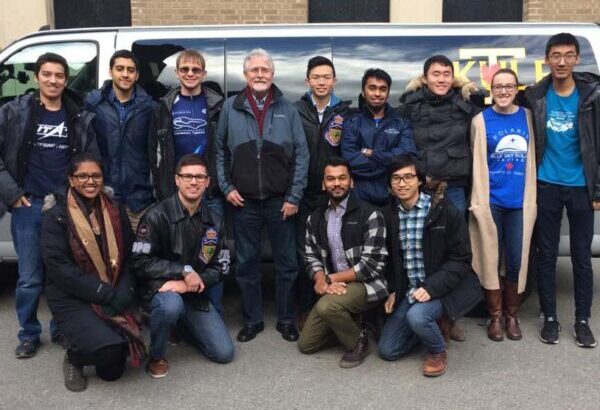“I wanted to pursue a career that aligned with my values and my interests,” says Tselot Tessema, a PhD candidate in industrial engineering at the University of Toronto. “Health systems improvement and technology design are fields I could see myself working in for the rest of my life. And when I researched possible schools, U of T was the only one I could find in Canada with a healthcare engineering program.”
Today, Tselot is working toward her doctorate at the university’s Centre for Healthcare Engineering (CHE), established in 2008 as a bridge between the health sector and academic research aimed at improving system efficiency and enhancing patient care. And as further evidence she chose the right career path, Tselot is the 2024 recipient of the 6T6 Industrial Engineering 50th Anniversary Award in Healthcare Engineering. Funded by alumni from the industrial engineering class of ’66, the scholarship is awarded annually to PhD students who excel in applying engineering principles and techniques to develop innovative healthcare solutions.
Tselot specializes in human factors engineering, a discipline that focuses on how people interact with technology and systems. “It blends elements of engineering and psychology, which I studied as an undergraduate at U of T,” she explains. “I’ve always been interested in human information processing and decision-making, which is why I studied neuroscience as part of my Honours BSc. It’s great to apply those concepts now in designing human- centred technology solutions.”
Expanding access to care
The focus of Tselot’s doctoral research – building on her master’s degree in industrial engineering, also from U of T – is developing digital self-care interventions for patients with chronic heart failure, particularly those in marginalized communities that have limited access to specialist care, along with low adoption of technology. Her research involves engaging with people who face obstacles in housing, education and employment, with the aim of facilitating access to healthcare services and information.
To gain deeper insights into the lives of patients with heart failure, Tselot is also a trainee at Transform HF, a partnership between U of T and the Ted Rogers Centre for Heart Research. Part of the university’s Institutional Strategic Initiatives (ISI) program – which fosters collaboration between research, industry, community and philanthropic partners – Transform HF connects patients with engineers, researchers and other community stakeholders to drive the development of technology-based solutions for heart failure.
“I’m really interested in the self-care aspect, which is underexplored and can be very impactful,” Tselot says. “I want to develop tools to support patient education, as well as clinical decision-making with regard to remote monitoring. Some tools can allow patients to recognize when their symptoms are worsening and decide if they need to see a doctor. Others can facilitate family physicians’ referrals for advanced care. My ultimate goal is to create human-centred solutions that improve patient health outcomes while easing the burden on clinicians and reducing system inefficiencies.”

A lasting legacy
The alumni behind the 6T6 Industrial Engineering 50th Anniversary Award in Healthcare Engineering include Mart Liinve, a member of the class of ’66 who began generously giving back to his alma mater in the 1990s through support for student bursaries. As their 50th reunion approached, Mart and his classmates – many of whom had stayed in touch over the decades – were inspired to do more. They decided to create two scholarships – one in Healthcare Engineering and one in Industrial Engineering – and contributed initial funding that was then matched by the university. Since it was first granted in 2017, the 6T6 award in healthcare engineering has so far supported 11 doctoral students.
“It’s very satisfying to make a big difference in someone’s life with a small effort on your part,” says Mart, who began his engineering career designing inventory control systems and went on to found a successful manufacturing company in upstate New York. “I’ve benefitted from an investment philosophy that’s focused on the power of saving, and that has allowed me to help others.”
Mart is the son of wartime refugees from Estonia who journeyed first to Sweden, where he was born in 1945, then emigrated to Canada to start a new life. He looks back fondly on his years at U of T and especially his fellow alumni: “I feel like I won the lottery when I joined that class.” Now retired, he remains committed to giving talented young students a helping hand, especially in the STEM disciplines he feels are critical to ensuring a better future. Underlining that commitment, he has provided for further scholarship funding in his will. And he encourages other alumni to see how even a modest endowed gift can have a significant long-term impact: “This is the best kind of legacy you can leave: to do some lasting good for your community and for the world.”
The value of that legacy is clear to appreciative recipients like Tselot. “I am profoundly grateful for my engineering education, which empowers me to design innovative technologies that enhance the health and well-being of communities,” she says. “It’s heartening to know there are alumni who want to support the next generation of healthcare engineers. And for all graduate students in the early stages of our journeys, it’s encouraging to have people who are further along in their careers offer us guidance, resources and mentorship.” Indeed, this last dimension is particularly meaningful to Tselot, who volunteers with the university’s Blueprint and STEAM Design programs. “This award will enable me to continue volunteering and providing support to young people, including future engineers and healthcare professionals.”
Scholarships, bursaries and other forms of financial assistance to students account for the largest share of the total paid out annually from the University of Toronto’s Endowment funds. For the U of T fiscal year ending April 30, 2024, about $1.56 billion – representing 43% of the university’s total $3.62 billion in endowments* – was directed to student support.*
* The “Endowment portfolio” managed by UTAM – also called the Long-Term Capital Appreciation Pool – comprises the university’s endowment funds plus other investment assets. As of April 30, 2024, U of T’s fiscal year-end, the total value of the Endowment portfolio was $4.4 billion, including $3.6 billion of endowment funds plus $0.8 billion of other long-term assets. (At UTAM’s year-end – December 31, 2024 – the Endowment portfolio was valued at $4.9 billion.)
